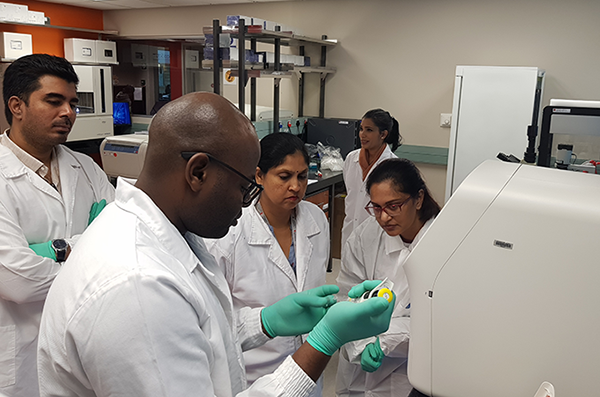KRISP open a CRISPR-Cas9 laboratory with Thermo Fisher Scientific in South Africa
KRISP flew two international specialists from Thermo Fisher Scientific to start our new CRISPR-Cas9 laboratory! We also received advanced training on genetic and epigenetic editing techniques in our own lab. KRISP has now all of the equipment to growth, edit and analyse cell lines. The lab is available for scientific service and it is a major development that will help to keep Africa at the cutting-edge of science.

What are genome editing and CRISPR-Cas9?
Genome editing (also called gene editing) is a group of technologies that give scientists the ability to change an organism's DNA. These technologies allow genetic material to be added, removed, or altered at particular locations in the genome. Several approaches to genome editing have been developed. A recent one is known as CRISPR-Cas9, which is short for clustered regularly interspaced short palindromic repeats and CRISPR-associated protein 9. The CRISPR-Cas9 system has generated a lot of excitement in the scientific community because it is faster, cheaper, more accurate, and more efficient than other existing genome editing methods.
CRISPR-Cas9 was adapted from a naturally occurring genome editing system in bacteria. The bacteria capture snippets of DNA from invading viruses and use them to create DNA segments known as CRISPR arrays. The CRISPR arrays allow the bacteria to "remember" the viruses (or closely related ones). If the viruses attack again, the bacteria produce RNA segments from the CRISPR arrays to target the viruses' DNA. The bacteria then use Cas9 or a similar enzyme to cut the DNA apart, which disables the virus.
Please note that the previous two paragraphs were extracted from NIH Genetics Home Reference, which full information is accessible at NIH website.
Why a CRISPR-Cas9 laboratory at KRISP?
KRISP CRISPR-Cas9 is a scientific service laboratory. This is a core resource for the whole scientific community. This will allow KRISP and other African researchers to have access to new technology to advance their research activities. We can also provide service to industrial community to help to bring some of this technologies to the market.
KRISP's CRISPR-Cas9 laboratory was constructed in collaboration with Thermo Fisher Scientific. We have purchased state-of-art incubators to grown cells, microscopies and advanced PCR facilities.
Below a video of the laboratory and the training provided by Thermo Fisher Scientific in South Africa.
Please contact us for more information on how we KRISP can help CRISPR-Cas9 experiments in Africa.
News date: 2020-03-05
Links:
KRISP has been created by the coordinated effort of the University of KwaZulu-Natal (UKZN), the Technology Innovation Agency (TIA) and the South African Medical Research Countil (SAMRC).
Location: K-RITH Tower Building
Nelson R Mandela School of Medicine, UKZN
719 Umbilo Road, Durban, South Africa.
Director: Prof. Tulio de Oliveira




